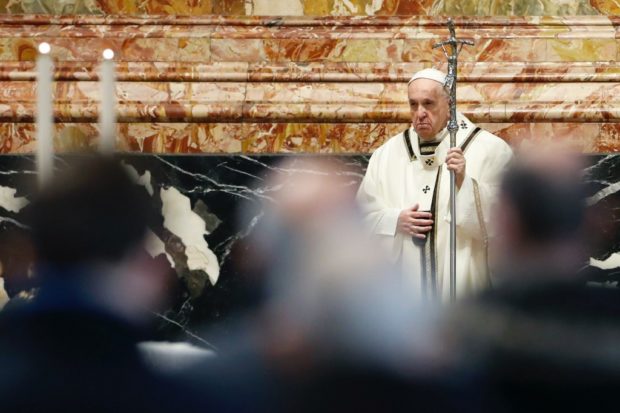Pope Francis, Queen Elizabeth join vaccine drive as UK tops 3 million COVID-19 cases
ROME — Pope Francis and Britain’s Queen Elizabeth became the latest high-profile figures to join the global vaccination campaign against the coronavirus, as the UK reported it had surpassed more than three million cases since the pandemic began more than a year ago.
More than 1.9 million people worldwide have now died from the virus, with new variants adding to soaring cases and prompting the re-introduction of restrictions on movement across the globe — even as some countries begin mass inoculation campaigns.
Pope Francis urged people to get the vaccination, calling opposition to the jab “suicidal denial” and saying he would get inoculated against the virus himself next week when the Vatican would begin its campaign.
“There is a suicidal denial which I cannot explain, but today we have to get vaccinated,” the pontiff said in segments from an interview with Canale 5 due to be broadcast in full on Sunday.
Britain’s Queen Elizabeth II and her husband Prince Philip received their Covid-19 vaccinations on Saturday, Buckingham Palace said, in a rare public comment on the private health matters of the long-serving monarch.
Article continues after this advertisementA source told the domestic Press Association news agency that the queen, 94, and Philip, 99, were given the injections by a royal household doctor at Windsor Castle.
Article continues after this advertisementMore than 1.5 million people in Britain have so far received virus jabs, as the biggest immunization program in its history rolls out with priority given to the elderly, their carers and health workers.
Countries across the globe are following suit, starting up massive vaccination campaigns with several coronavirus shots approved so far, including those by Pfizer-BioNTech and Moderna and domestically made jabs from Russia and China.
Britain, which has so far administered two types of vaccines, is racing to inoculate as many people as possible as a new variant believed to be more contagious pushes infections and deaths to unprecedented levels.
British health authorities on Saturday said the country had recorded more than three million coronavirus infections since the pandemic began last year, after the government announced another 59,937 new daily cases.
The country also recorded another 1,035 fatalities from the virus, taking the total death toll to 80,868, one of the highest in Europe alongside Italy.
Cases also continue to spiral in the United States, the world’s worst hit country, which recorded more than 272,000 new cases Saturday. More than 22 million people have been infected and 372,051 have died of Covid-19 in the US since the pandemic began, according to Johns Hopkins University.
Tighter restrictions
India will launch one of the world’s most ambitious coronavirus free vaccination drives next Saturday, aiming to reach 300 million people by July, Prime Minister Narendra Modi said.
India is the second worst-hit country with more than 10 million cases, though the death rate is one of the world’s lowest.
Cuba, meanwhile, said it would test its most advanced Covid vaccine candidate in Iran, after Tehran banned the import of already-proven US and British-produced vaccines.
Fears have been rising over new virus variants that emerged in Britain and South Africa, but BioNTech brought some relief on Friday, saying its vaccine was effective against a “key mutation” found in the strains.
Soaring infections are forcing governments once again to introduce restrictions that helped slow the spread of the virus last year, but battered the global economy and disrupted business, sports and cultural events worldwide.
France will extend its Covid-19 curfews to a further eight departments, Prime Minister Jean Castex said Saturday, citing a “tough and necessary” response.
After a rise in cases, Burundi will close its land and lakeside borders from Monday and impose a seven-day quarantine on travelers arriving by plane, officials said.
New British strain
On Saturday the streets of the Australian city of Brisbane were quiet as its more than two million residents were ordered back into lockdown, after authorities detected a single infection of the new strain from Britain.
“Quite surreal, like something from a movie set,” local man Scott told AFP in Brisbane’s deserted downtown, though he added: “It’s necessary.”
And Israel said four people had tested positive for the new South African strain, which is also more infectious than the original. It had already recorded the new British variant.
In China, where the original coronavirus first emerged in late 2019, authorities also tightened restrictions on two cities near Beijing to stamp out a growing cluster.
The new week-long stay at home orders affecting about 18 million people in Shijiazhuang and Xingtai come as cases spike ahead of the Lunar New Year, when hundreds of millions criss-cross the country to visit family and friends.
On Saturday Beijing’s National Health Commission said authorities had so far given out more than nine million vaccine doses, but warned the upcoming holiday would “further boost the risk of transmission.”
China also said Saturday that preparations were still ongoing for a WHO mission to Wuhan to investigate the origins of Covid-19, following a rare rebuke from the UN body over a delay to the long-planned trip.
“As long as these experts complete the procedures and confirm their schedule, we will go to Wuhan together to carry out investigations,” National Health Commission vice minister Zeng Yixin told reporters.
For more news about the novel coronavirus click here.
What you need to know about Coronavirus.
For more information on COVID-19, call the DOH Hotline: (02) 86517800 local 1149/1150.
The Inquirer Foundation supports our healthcare frontliners and is still accepting cash donations to be deposited at Banco de Oro (BDO) current account #007960018860 or donate through PayMaya using this link.
